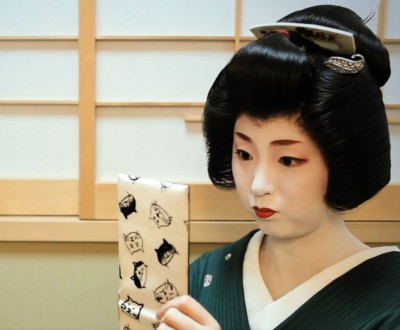The Geisha's confusing role
It seems that the concept of Geisha perpetuates quite a number of stereotypes in Western countries, especially about the sometimes scorned role of these women. Regularly, we can hear that Geisha would be systematically escort girls or prostitutes, and our article will help clarify this thorny question.
Originally, the Geisha term literally means "practicing the arts". It had been introduced in the middle of the 18th century and, at that time, gathered men and women supposed to entertain お茶屋 ochaya (tea houses) clients. The Geisha, very refined, had to master numerous Japanese traditional arts (music, dance, tea ceremony, floral arts…) and possessed an excellent general knowledge to follow and improve all types of discussions. It's still the case today. This profession was officially recognized by the government in 1779 and prohibited prostitution, which by the way was forbidden in Japan only sixty years after, and finally totally banned in 1957.
Ensuring Japanese tradition, Geisha never stopped witnessing their number decrease despite a small revival these past years. Nowadays, they can be found almost exclusively in Kyoto, where they are known as 芸妓 Geiko, while their apprentice are called 舞妓 Maiko. They are gathered in one of the five 花町 hanamachi (literally "flower cities") which are Gion, Pontocho, Miyagawacho, Kamishichiken and the old-fashioned Shimabara.
Ladies-in-waiting or simple kimono-wearing prostitutes?
The wrong ideas perceived in Western may come from diverse reasons and language mistakes:
- the white make-up on their faces and kimono clothing can be confused with the outfit of Tayû / Oiran, high ranked courtesans (or luxury prostitutes) from Edo era;
- in the 2000’s popular culture, the Memoirs of a Geisha movie transformed the novel into a Hollywood story which awkwardly treated the topic of comfort women during the war, still being debated today;
- the "geisha balls" sexual accessory, to stimulate or reinforce, gets its name only in Western countries while its origin comes from Taoism and Tantra.
It is not officially said that Geisha can not have sexual relationships with their clients, but it has always remained unofficial for elegance and prestige images. Even the Danna, wealthy support / protector supposed to bring financial stability to the young women, sometimes purchased their virginity for reputation issue and not to benefit physically from them.
Geisha are not recruited like in the past and the voluntary process of following this teaching is less interfering with celibacy, which was a non-questionable condition until marriage, itself ringing the end of being a Geisha.
The life of a Geisha in Kyoto
It seems there is a lot of fantasy around Japanese Geisha, heiress of secular traditions, from which the gaijin (foreigner) doesn't know the truth about it in present-day Japan. This is probably why we often hear that they are luxury escort girls (or for some, disguised prostitutes).
If you are traveling in Japan, the simplest way to get a glimpse at one is to wander around Gion or Pontocho districts in Kyoto, where they often move around to go to an Okiya (置屋 Geisha’s house). Beware: Geisha / Geiko / Maiko do not like photoshoots, so please avoid being that annoying tourist following them and shooting at them with the flash on.
Guardians of Japanese tradition, as it is always the case today, Geisha / Geiko follow a specific education, very precise in arts (tea ceremony, ikebana flower arrangement…), traditional musics (shamisen, taiko…) and sometimes in dancing. Their role is the one of a lady-in-waiting, mostly for lunch or dinner between wealthy business men.
Geisha’s costumes are made of a handmade silk kimono 👘 (which cost can exceed ¥500,000 / ~US$3,253) with a large belt of silk tied in their back (obi), socks (tabi) and wooden sandals (geta). Their faces are made up of white rice powder, up to the nape of their necks. Visually, they can be confused with Oiran, courtesans whose origin dates back earlier than Geisha.
Glen Milner had the opportunity, for the British Telegraph, to come along with Miehina, a Kyoto Geiko during one full day. The superb (but short) video offers you to learn more about them:

